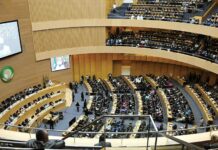
At the very heart of Africa’s problems is our poor infrastructure. Things like poor road infrastructure, lack of constant electricity, and lack of running water are all too common in so many of our countries. It is virtually impossible to run any kind of functioning economy without any of this basic infrastructure, yet in so many of our countries, access to these things is a privilege only available to our wealthiest populace. This poor infrastructure is the reason for the incredibly high levels of poverty that continue to exist all around the continent. The question I would like to ask is why?
The fact is that much of this infrastructure is supposed to be built by our governments, yet our governments have proven to be highly ineffective when it comes to building infrastructure. The question that arises is, why are our governments so inefficient? It certainly cannot be due to a lack of funds. African countries are among the most resource-rich nations on the planet. Every year, our governments receive billions of dollars of revenue from the mining of our natural resources, in addition to the billions in tax revenue received from people and businesses.
If these billions in revenue are not going towards our country’s infrastructure, then where does it go? I was recently in conversation with members of my family, and the topic of government salaries came up. One of my family members recalled the enormous salary a colleague of hers had shared that she earns from working for our city council. The gigantic amount of money that this civil servant alone was making was difficult to wrap my head around. The amount of money that this public sector worker was making in one month would be enough to feed multiple families for a year.
Sadly, this has become the norm across much of Africa. It is commonplace for elected officials and government employees to grant themselves extravagant salaries, often far beyond what their economies can reasonably sustain. In many cases, these inflated wages consume a disproportionate share of our national budgets, leaving limited resources for the core functions of government. The result is that vital public infrastructure, such as our roads, power stations, and water treatment facilities, continue to deteriorate while those in power enrich themselves.
Under normal circumstances in free market economies, you are supposed to be remunerated for the amount of value that you offer to the market. However, our countries operate in almost the exact opposite way. Rather, it is government officials who fail to fulfil their basic obligations, therefore arguably providing the least amount of value to our societies, who are typically the best salaried. As a results, the incentive structure in our countries then lead to people pursuing careers in government rather than towards innovation and development.
In other countries, those who aspire to earn a large salary typically pursue specialised skills or build successful businesses. But when the basic infrastructure required for entrepreneurship to thrive is nonexistent, and the only well-paying career paths lie in government, talented individuals face a difficult choice of either taking their skills abroad or settling for government positions. In both cases, this cycle of underdevelopment is only reinforced in our countries.
If these extravagant salaries earned by government officials weren’t enough, the little money allocated for actual government functions is regularly embezzled by those same government officials. It is commonplace to read stories of government officials awarding government contracts to businesses linked to them or their families. Such as the current corruption case involving the former governor of Kano state, Abdullahi Ganduje, of alleged misappropriation of public funds and allocation of plots of land to some members of his immediate family.
Instead of government tenders being awarded to businesses best equipped to deliver, corruption and nepotism dominate the process. Public funds are squandered on project after project that remain incomplete or poorly executed. Meanwhile, while widespread poverty persists all around our continent . As officials continue to pocket these vast sums of public money, millions of our citizens are left relying on food and medical assistance from governments halfway across the world.
This is not a problem that can be solved simply by electing a new government. Too often, a change in leadership merely means a new group of people stepping in to enjoy the same privileges and exploits as their predecessors. Time and again, we see opposition parties make sweeping promises about how they will transform our countries, yet once in power, theses systems remains largely unchanged. And nothing will truly improve as long as such large shares of our public funds continues to be siphoned into the pockets of politicians and bureaucrats.
To improve our economic outlook, we need a fundamental rethink of what it means to be an elected official or civil servant in our countries. We must end the culture of people entering government primarily to enrich themselves. Our politics and public service should be driven by a genuine desire to improve our nations, rather than by the lure of personal gain. Those who are seeking lucrative careers should be encouraged to pursue them in the private sector, where success is earned through merit and innovation, rather than through political connections.
The ironic thing is that this type of system would benefit everybody. If the government actually just fulfilled its duty by building up our infrastructure, everybody would benefit, including the politicians themselves. In the same manner, the widespread poverty that exists in African countries affects everybody, including politicians. For example, the dismal state of Nigeria’s power grid has resulted in power outages that have affected even the residence of the President. In the same way, militancy from armed groups impacts the entirety of Nigeria due to the inability of our security forces.
How much better would life be if we had running water, reliable electricity to power our homes and businesses, and good roads and trains to move our goods? How much better would it be if opportunity and prosperity were available to all of us, rather than just a privileged few? How much better would it feel to build fulfilling lives in our own countries, instead of being forced to seek opportunities abroad? A better life for Africans across the continent is not beyond reach; it is possible if only we had governments truly committed to improving the livelihoods of our people.











